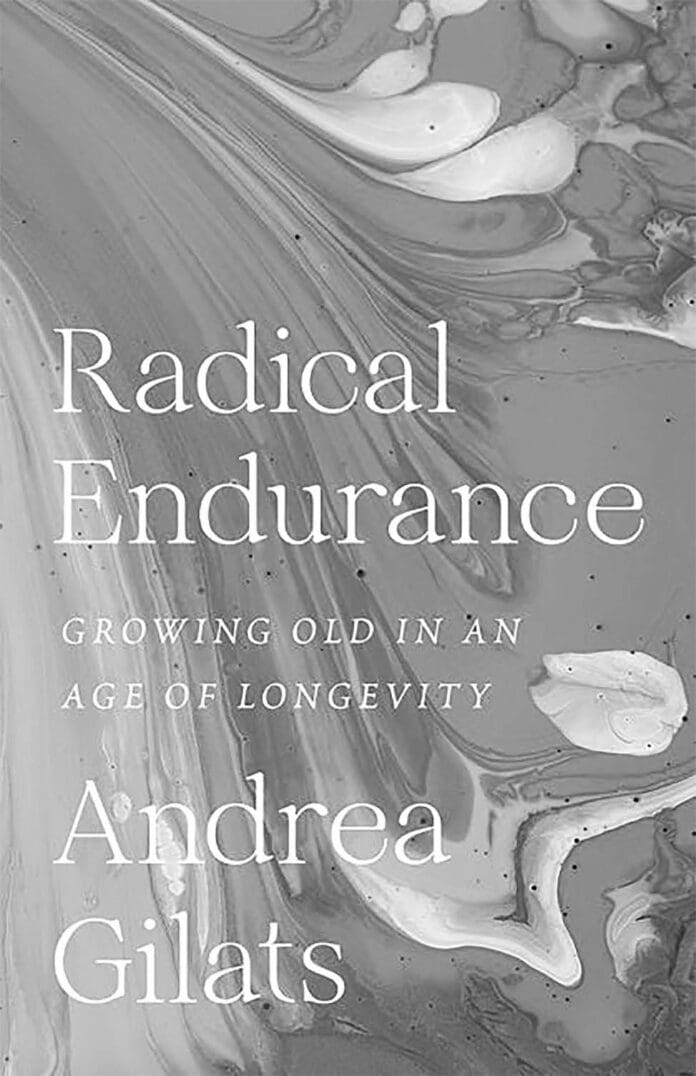Although Andrea (Andy) Gilats, Ph.D., has spent nearly 80 years rooted in St. Paul, Minnesota, her life has been anything but static. As a writer, educator, artist, and former yoga teacher, she’s navigated profound personal and professional transitions—experiences that shape the wisdom at the heart of her latest book, Radical Endurance: Growing Old in an Age of Longevity.
Published by the University of Minnesota Press, Radical Endurance is described as “a personal guide to the transformations, hard truths, profound pleasures, and infinite possibilities of aging.”
Andrea Gilats knows a thing or two about transformation — not just in the abstract, but through personal experience, professional reinvention, and a deeply reflective approach to aging.
With a freshly earned Bachelor’s degree in Fine Arts from the University of Minnesota, Gilats began her professional journey not in a studio, but behind a desk — working as a secretary for the university’s Continuing Education in the Arts program.
“I was newly married at the time,” she recalled. “I thought, well, I’ll be a secretary and I’ll be close to art somehow.”
What started as a practical decision turned into something much more meaningful. “And that was a gift in my life,” she said, “because it led me to my long career at the university — 34 years — working with others to create and direct lifelong learning programs.”
Gilats spent two decades as the founding director of the Split Rock Arts Program, a role that allowed her to shape and nurture a vibrant community of artists and learners.
“It was a very successful program. It brought people literally from all over the world to Duluth to work with practicing artists and writers,” said Gilats. “My work with the Split Rock Arts Program was quite intense, as you can imagine. I worked with literally thousands of artists. I think I was a little burnt out.”
Around that time, the university offered her a new opportunity to develop programs focused on people approaching retirement. The timing felt especially meaningful, as the oldest baby boomers were just beginning to turn 65—and Gilats found herself in that very same stage of life.
She went on to create and lead two pioneering programs designed specifically for older adults: Learning Life, which focused on lifelong education, and Encore Transitions: Preparing for Post-Career Life, a program aimed at helping individuals navigate the challenges and opportunities that come with retirement and the next chapter of life.
“I was in the same cohort age as people that were starting to think about retirement. So, it was resonant in my own life. There were a lot of us fish in that big lake,” she said. “It was one of the most enriching and rewarding experiences I could have had. I had thought about how to get some of the things that I learned from that work out to a broader audience.”
After her time leading the Split Rock Arts Program, Gilats said her “creative juices were rejuvenated.” She rediscovered her passion for writing, turning her attention to personal essays that explored her life as an artist and celebrated the musicians who inspired her.
“I had given so much of my inner creativity to that program. But when I left, I began to regain the energy, the type of energy it takes to do something creative,” she said. “I have learned so much from the writers I worked with over the years, and that was almost like having a college curriculum.”
Her first book, Restoring Flexibility: A Gentle Yoga-Based Practice to Increase Mobility at Any Age (Ulysses Press, 2015), was born out of a personal journey. After taking a chance and trying yoga classes at a local gym, Gilats found a new path that would inspire her to share a gentle, accessible approach to movement for people of all ages.
Friends encouraged her to try yoga as a way to heal. Gilats had lost her husband to cancer when he was just 52 and she was 53. Struggling with prolonged grief disorder—a deep and lasting grief that extends beyond the usual time frame and makes everyday life difficult—she began practicing yoga at age 65.
“I felt like a duck in water,” she said. Embracing this new chapter of transformation, she went on to train at a vocational college in St. Paul to become a yoga teacher, focusing especially on a cause close to her heart.
“I promised myself that I would only work with older people,” she explained. “People who wouldn’t feel comfortable going into a yoga studio in their tights, you know, and people who might not feel comfortable in other settings.”
She taught yoga for eight years in community settings such as the Center for Aging in St. Paul. Her youngest student was in her late 40s and living with Parkinson’s disease, while her oldest student, a remarkably well-balanced woman named Estella, was 98 years old. This wide range of ages and abilities reinforced Gilats’s belief in the importance of gentle, accessible movement for all stages of life.
“It was quite an experience,” Gilats recalled. “It turned out that my classes were popular. People liked that gentle, very sensitive approach to learning yoga. We need to be careful as we age. We don’t want to go beyond what our bodies are comfortable with. So much of the whole exercise world is about ‘no pain, no gain.’ I knew I did not believe that.”
To reach a broader audience, Gilats decided to write a book focused on maintaining mobility at any age. Written in her late 60s and early 70s, the book also serves as a partial memoir, sharing the personal story of how she discovered yoga later in life and how it transformed her approach to aging and wellness.
Having always found writing to be a healing experience, and motivated by a deep desire to help others facing similar challenges, her next book focused on her journey through prolonged grief disorder—offering insight, understanding, and hope to those navigating the difficult terrain of loss and recovery.
“At the time I wrote my book about it, it was called complicated grief,” she explained. “It’s debilitating. You get stuck in your grief and it’s very hard for you to move on. Even just daily functions of living become difficult. So, I thought—this is an experience that others might identify with.”
Her second book, After Effects: A Memoir of Complicated Grief, was published in 2022 by the University of Minnesota Press. The memoir resonated widely and earned an Honorable Mention from the Foreword Indies 2023 Book Awards, highlighting its profound impact in the genre of grief and healing literature.
“It gave me such joy. Joy that I had not known since my husband died,” Gilats said, of writing. “It’s the kind of endeavor or project I love the most. My knitting takes second place!”
The title Radical Endurance came from Gilats’ reflection on turning 75 and recognizing the growing number of people living long, full lives. It captures the resilience and adaptability required to navigate the later stages of life with purpose and vitality.
“Old age can be as long as middle age. That alone is radical because it’s so different from probably even 50 years ago,” she said. “We endure. So, I put those words together, Radical Endurance. It means going beyond what we might have expected when we were young and enduring for what one psychologist has called an extra-long life.”
Just before she turned 75, Gilats experienced what she calls a “leap of consciousness.” One morning, while watching the news, a sudden “shockwave” hit her—the clear realization that she was no longer simply aging but was now officially considered old. This moment sparked deep reflection on what it truly means to grow old, not just older.
The book also addresses the pervasive issue of ageism, exploring how society’s attitudes and stereotypes about aging impact the way older adults are perceived and treated. Gilats challenges these biases, encouraging readers to rethink what it means to grow older with dignity and vitality.
“I think it’s so pervasive that we hardly notice it, and yet it’s a prejudice,” she said. “It’s very unfair in the way people treat older people, both men and women. I think even the word ‘old’ has negative connotations.”
She added, “It can affect our self-image as we live in old age— we think less of ourselves, that we’re not what we used to be, not as capable, or worse, that we’re not all there anymore. So, I felt it was important in Radical Endurance to talk about that, especially in the way it affects us personally.”
Gilats emphasizes the power of optimism as a vital force in enduring the challenges of aging. She believes that maintaining a hopeful and positive outlook can transform the aging experience, helping individuals embrace change, find meaning, and continue to grow despite life’s inevitable difficulties.
“I think part of what I went through during my full-on grief, which lasted about 10 years, is that I’m naturally an optimist,” she said. “And feeling such deep grief for so long felt, in the end, like I was going against my own nature. I finally said, wait a minute. I don’t want to be unhappy anymore. I want to feel happy. And so I began to think more optimistically.”
It’s through optimism that Gilats has also found a greater acceptance of reality, allowing her to face the complexities of aging with both courage and grace. This hopeful mindset doesn’t ignore difficulties but instead helps her navigate them with resilience, seeing each challenge as an opportunity for growth.
“My lesson has been to let the chips fall and to make the best of whatever you are given,” she said. “When you’re my age, something will happen. You might have a health issue. You might have a significant loss. But having lived so long prepares us to live well, even with losses and illnesses.”
She’s been surprised by how many readers have told her they didn’t realize old age could be a time to be happy. This reaction underscores the need to shift perceptions about aging and its possibilities.
“What surprised them about the book was just that outlook—being happy at old age, no matter what the heck is going wrong with you,” she said. “Most old people are healthy. Our lifestyles may be different. We may have limitations we didn’t have when we were younger. But the possibility of a good life remains there for us.”
Gilats is currently working on a new book titled Somewhere Over the Rainbow. This upcoming work chronicles her travels with her husband and reflects on her experiences working closely with the American Indian Studies Department in Continuing Education at the University of Minnesota. Through this project, she continues to explore themes of connection, culture, and personal growth.
“As an arts person, I was so interested in Native American art,” she said. “My husband and I took many road trips up north and all over. Those were our vacations every summer. I collected a lot of Native American beadwork and got to know some of those artists in South Dakota, North Dakota, Montana, Wyoming, and of course all-over northern Minnesota. I’ve thought for years I wanted to honor these artists by writing about my time meeting them and collecting their work. It’s brought back so many memories for me.”
Andrea Gilats will visit Drury Lane Books (12 Wisconsin St., Grand Marais) on Saturday, June 7 at 6:00 PM. The event will include a reading from her work, along with stories from her life and career. Gilats hopes to engage in meaningful conversation with readers and attendees, making it an interactive and memorable evening.
To learn more about Andrea Gilats, visit andreagilats.com.





